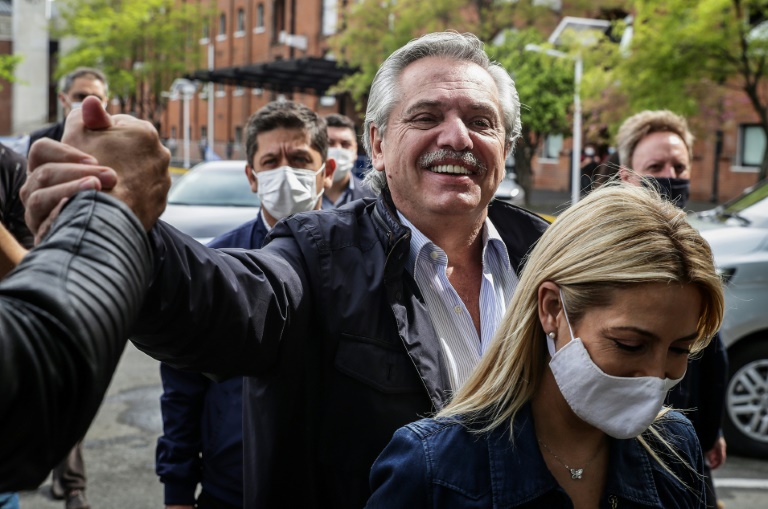Argentines voted Sunday in midterm legislative elections with center-left President Alberto Fernandez struggling to maintain his Senate majority for the two years remaining in his term.
Nearly half the lower house Chamber of Deputies seats are up for grabs, as well as a third of Senate seats.
“We’ve finished a very good electoral day. Everything went normally,” said Interior Minister Wado de Pedro after polls closed at 6:00 pm (2100 GMT).
He said turnout in the compulsory election was between 71 and 72 percent.
First results are expected at around 9:00 pm.
Fernandez’s Frente de Todos (Everyone’s Front) party is already a minority in the lower house. Amid widespread discontent over an economy hit hard by the Covid pandemic, analysts say the party risks losing its Senate majority as well.
“We ask the Argentines to make their will known so we can build the country that they want,” Fernandez told reporters after casting his vote, accompanied by First Lady Fabiola Yanez.
In September, the Frente suffered a bruising defeat in primaries, picking up just 33 percent of the vote compared to 37 percent for the main opposition group Juntos por el Cambio (Together for Change), led by Fernandez’s predecessor Mauricio Macri.
“If the results of the PASO (September’s primary) are repeated, the ruling party could lose its majority in the Senate,” said political analyst Rosendo Fraga of the New Majority think tank.
However, De Pedro said Sunday’s turnout was higher than for the primaries.
The country has been in recession since 2018, with GDP dropping 9.9 percent last year due to the coronavirus pandemic.
Argentina has one of the world’s highest inflation rates, at 40 percent so far this year, and a poverty rate of 42 percent for a population of 45 million.
“I fear for the economy,” pastry worker Oscar Navarro told AFP on Sunday, without revealing how he planned to vote. “Salaries are not sufficient. Whoever wins, it will take a long time for the country to recover.”
The primaries setback unleashed a political crisis pitting Fernandez against his deputy president and coalition partner Cristina Kirchner, who pressured her boss into a cabinet reshuffle in the hopes of appeasing an increasingly frustrated electorate.
If the Frente loses its Senate majority, the opposition “will most probably use” its legislative blocking power, said analyst Gabriel Puricelli of the University of Buenos Aires.
The Frente would then be forced to make concessions if it wants to pass laws or make key appointments, including to the judiciary.
– Possible wild-card candidate –
Since the primaries, the government has been in damage limitation mode, announcing last month a deal with the private sector to freeze prices on more than 1,500 basic goods, following street protests demanding greater food subsidies.
It has also increased the minimum wage and family allowances.
While Fernandez has promised to focus on the country’s immediate concerns, candidates are already racing towards the presidential elections of 2023.
“These next two years are going to be difficult,” said Macri, the opposition leader, while assuring voters that his coalition would “act with great responsibility.”
Liliana Marquez, a hospital worker, said she hoped the opposition would prevail. “I have never trusted these Peronist governments,” she said, adding that she supported Macri’s movement “because I cannot find an alternative.”
The government’s supporters have been forced to keep a low profile during the long pandemic lockdowns. But pro-government trade unions and social organizations recently announced they will march in support of Fernandez on Wednesday, regardless of the election results.
Many eyes will be on Buenos Aires province, a traditional bastion of Peronists, including Fernandez’s party, but where Macri’s Juntos made great strides in September.
A potential spoiler, however, is the provocative Javier Milei — an ultra-liberal, anti-establishment economist who is pushing for a seat in the Chamber of Deputies for the city of Buenos Aires.
Milei has criticized both the center-right opposition and the center-left government — and has them both worried.
His rise has drawn comparisons to successful populists like Donald Trump in the United States or Brazilian President Jair Bolsonaro.
Milei has attracted supporters from a broad swath of socio-economic backgrounds, particularly among men aged 18 to 40, analysts say.
He has also caught Macri’s attention.
“The ideas Milei has been espousing, I have always expressed them,” the former president said recently.










